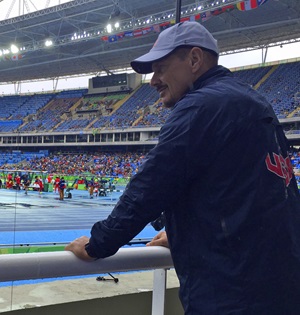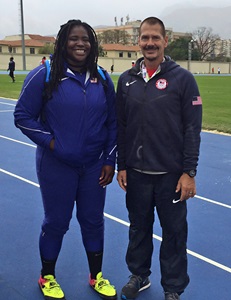August 18, 2016

With almost 20 years experience to his credit, kinesiology professor Larry Judge is at the Olympics in Rio de Janeiro. He is coaching shot-putter Felisha Johnson.
Larry Judge has had a long career as one of the top track and field coaches in the country, but he is most proud of working one-on-one with athletes to dramatically improve their performance.
Judge has nearly two decades’ experience coaching collegiate track and field and cross-country, including stops at the universities of Florida, South Carolina and Wyoming, plus Indiana State. He has trained nine Olympians, 11 NCAA champions and more than 100 All-Americans.
The Ball State professor of kinesiology, now part of the university’s new College of Health, is building on that resume as the personal coach of 27-year-old Felisha Johnson, who made her Olympics debut Friday in Rio. In September, he will use his experience to assist the U.S. Paralympic track and field team during the Paralympic Games, which also will be in Rio.
Judge began working with Johnson, a shot-putter, last year. “Felisha is an incredible athlete and had been an NCAA champion but was seventh at the 2015 U.S. championships. So, we worked to change her technique to improve her throwing distance.”
“In my position as a Ball State faculty member and coordinator of the Athletic Coaching Education graduate program, I’ll be able to share what I’ve learned from not only day-to-day training of world-class athletes but also the experience of being on the sidelines of two major events so close together.”
— Larry Judge
professor of kinesiology and U.S. Olympic track and field coach
After months of intense coaching, Johnson’s significant improvement helped her make the U.S. Olympic team in July — then she narrowly missed getting into the Olympic finals. The two-time NCAA champion had a best put that was a mere 7 centimeters (2.75 inches) short of being among the top 12 finals qualifiers. She finished 14th.
“Felisha did an amazing job in her first Olympic experience,” Judge said. “She worked hard and just came up short, which was bittersweet. I think she’s even more determined to come back and prepare to qualify for the 2020 Olympics in Tokyo.”
He believes the hours the pair put in made the difference. This spring and summer, they were in constant contact, and Johnson’s progress helped her finish a surprising third in the U.S. trials in Eugene, Oregon.
“That simply was an amazing accomplishment,” said Judge, who is also associate chair of Ball State’s School of Kinesiology and coordinator of the Athletic Coaching Education graduate program.
Johnson attributes her first Olympic opportunity to Judge’s dedication to bettering her skills.
“Larry did a great job talking me through the U.S. trials,” said Johnson, a graduate of Indiana State and Lawrence North High School in Indianapolis. “There were times when we were separated by distance, but he kept watching me live on video chat, giving me all sorts of advice and helping me to improve.”
It’s all in the little things
Judge believes the key to success for any athlete is to focus on the details.
“In my role, I have to think about optimizing performance in every part of their lives, including sleep, food, mental approach and how their lives are organized,” he said. “We have to keep them on a regular routine and cut the distractions so they can focus on what they do best.”
After the Olympics end, Judge will stay in Rio to be an assistant coach for the U.S. Paralympic track and field team, working in the throwing events, which include the discus, javelin and shot put.
The 15th Paralympic Games, which begin Sept. 7, are open to athletes with physical disabilities. While on leave during spring semester, Judge worked with some of those athletes at the U.S. Olympic Training Center in Chula Vista, Calif.
“We had a very rigorous training program out there that includes 90 minutes of practice in the morning and another 90 minutes in the afternoon, plus weight training,” he said. “To be successful, you have to surround your athletes with a village. At the training center, we had access to incredible nutrition, training facilities and biomechanical support. I think our athletes should do well at the Paralympics.”
Back to class

After Judge is done coaching Johnson, he will remain in Rio to serve as an assistant coach for the U.S. Paralympic track and field team.
Judge will bring back to the classroom his observations and data from training and the Olympics and Paralympics. He’ll also write articles about his findings.
During his academic career, Judge has published more than 50 articles and delivered nearly 200 presentations about strength and conditioning, nutrition and the throwing events. His primary research interests include fair play in sport, facility design and performance enhancement of athletes.
“In my position as a Ball State faculty member and coordinator of the Athletic Coaching Education graduate program, I’ll be able to share what I’ve learned from not only day-to-day training of world-class athletes but also the experience of being on the sidelines of two major events so close together.”
And his school’s longtime leader calls Judge a one-in-a-million asset for the university.
“His expertise in his field has served to promote excellence in his scholarship, teaching and service here at Ball State,” said Tom Weidner, chairperson of the School of Kinesiology and George and Frances Ball Distinguished Professor of Athletic Training. “His resume as a coach-practitioner is laudable. His strong coaching background and immersion in the field allow him to skillfully teach courses in our school’s graduate athletic coaching online program, undergraduate exercise science major and coaching minor, which he recently revitalized.
“Larry’s student ratings are consistently very high, with strong student comments. And students notably benefit from his mentorship outside of the classroom, as well. His commitment to our school and to Ball State is commendable, and we are very lucky to have him.”
By Marc Ransford, Senior Communications Strategist